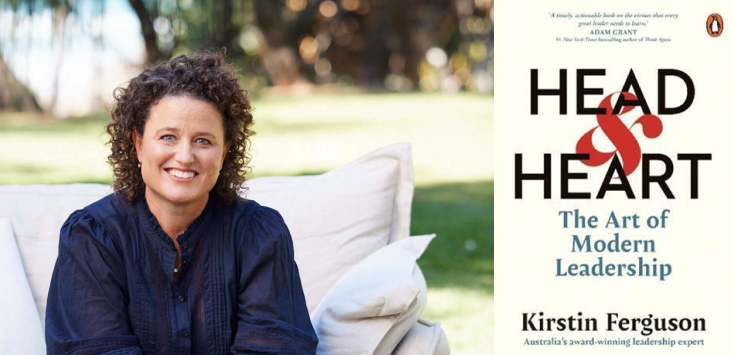
Source: supplied.
Your formal position title or place in the org chart does not define whether you are a leader. The concept of modern leadership is broader than simply thinking about formal authority or positions of power.
A leader is anyone who can influence and impact others through their words, actions and behaviours. A modern leader understands the most effective way to lead is by using their head and their heart.
Broadening the definition of leadership is not suggesting that everyone is a formal leader; I am not suggesting that we can all suddenly think of ourselves as the CEO. That would lead to chaos. But what is needed is a shift from the way we have thought of leaders for centuries, where we have viewed them as a finite resource.
Leadership is not a scarcity competition; everyone wins when we all lead well.
Modern leaders are comfortable not having all the answers
Modern leaders recognise every moment offers the opportunity for us to leave a rough wake or smooth waters.
Modern leaders are not perfect. Far from it. Leading, like living, is a series of missteps and challenges, setbacks and lessons learnt. We will be invariably learning some of the same lessons our entire lives. The humility to know we don’t have all the answers and the curiosity to search for a solution requires a modern leader who understands when to lead with their head, and when to lead with their heart.
The art of being a modern leader is knowing what balance of leadership attributes is needed, and when. In any given situation, context or conversation you will need to draw on skills from both the head and heart to be the most effective leader you can be. It is impossible to make a critical decision based on well-researched data without also considering the human cost of the decision.
There is no one way of leading well. Everyone will do it differently.
The more attributes of a head and heart leader you can draw upon, the more effective you will be in the widest range of situations you might find yourself leading in.
In some situations, to get the best possible outcome in a conversation or a crisis, you will need to use different skills depending on the situation.
Knowing what leadership attributes to use, and when, is the art of modern leadership.
Leading with the head and heart
Using quantitative research in conjunction with Queensland University of Technology (QUT) Business School, I identified eight leadership attributes that are the key ingredients for a modern leader.
These include four head-based attributes — curiosity, wisdom, perspective, and capability as well as four heart-based attributes — humility, self-awareness, courage, and empathy. You can measure your own head and heart leadership in each of these areas by visiting www.headheartleader.com.
Some of the key findings of my research:
1. Leading with perspective has a special quality
Being able to lead with perspective, or in other words, being able to ‘read the room’ is highly correlated with a leader who has high levels of empathy, capability, and self-awareness. Of all eight attributes, the ability to lead with perspective allows you to be an empathetic leader who is also capable and self-aware.
2. Being aware of your limitations is key
Being aware of your limitations is a key skill for modern leaders and strongly correlates with all eight head and heart attributes. This is because being aware of your limitations means you are more likely to be curious about other answers, humble about your inability to know everything and self-aware of your abilities.
3. Modern leaders are prepared to challenge their assumptions
Leaders who self-assess as being willing to challenge what they thought they knew are more likely to be leaders who self-assess as being courageous and having high levels of empathy. This is because they are willing to accept they don’t know everything and are willing to seek out the views of others that may be quite different to theirs.
4. Modern leaders are open to the ideas of others
If you self-assess as being open to the ideas of others, you are likely to also have high levels of perspective, empathy, and curiosity. This is because modern leaders value diverse points of view, are curious about things they may not understand, and they know that to make the best decision they must be able to ‘read the room’ and incorporate many different perspectives.
For all the leadership experiences we might have, the different teams we lead, the different ways we seek to lead in formal or informal ways – all of it comes down to knowing how and when to best lead with our heads and our hearts.
This is the art of modern leadership.
Dr Kirstin Ferguson AM is an author, columnist, and company director. She is an Adjunct Professor at QUT Business School and the former Deputy Chair of the Australian Broadcasting Corporation (ABC).
This is an edited extract from Ferguson’s new book, Head & Heart: The Art of Modern Leadership (Penguin Random House, 2023), which is available now.



COMMENTS
SmartCompany is committed to hosting lively discussions. Help us keep the conversation useful, interesting and welcoming. We aim to publish comments quickly in the interest of promoting robust conversation, but we’re a small team and we deploy filters to protect against legal risk. Occasionally your comment may be held up while it is being reviewed, but we’re working as fast as we can to keep the conversation rolling.
The SmartCompany comment section is members-only content. Please subscribe to leave a comment.
The SmartCompany comment section is members-only content. Please login to leave a comment.